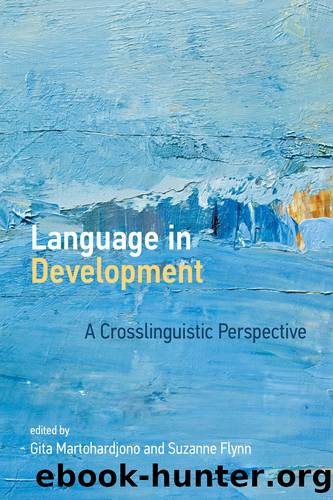Language in Development by Martohardjono Gita; Flynn Suzanne;

Author:Martohardjono, Gita; Flynn, Suzanne;
Language: eng
Format: epub
Tags: First and second language acquisition; heritage language development; language disorders; input factors; crosslinguistic influence in development
Publisher: MIT Press
Research Questions and Hypotheses
My first research question was empirical. I wanted to know whether my native-speaker intuitions about aspectual ambiguity of the hacer questions and their possible answers would be confirmed.
A. Do monolingual Spanish speakers understand imperfect questions as asking about habitual and ongoing activity but progressive answers as asking about ongoing activity only?
Hypothesis 1: If the discourse context (i.e., the tense aspect features of the question verb) affects its interpretation as an ongoing or habitual activity, then this difference in interpretation should have an effect on the answers produced by adults and children (i.e., the possible and impossible answers for each question shown in table 7.1). More specifically,
a.â â â â Progressive and imperfect questions can be answered with the four answer types (since in principle imperfect questions could be understood as asking about ongoing activity).
b.â â â â But we should also see a different distribution of answers depending on the question; that is, ambiguous imperfect questions should have a larger proportion of imperfect and infinitive answers than the progressive questions.
One of the purposes of this study was to discover whether adult participants would produce the four types of answers shown in table 7.1 for the ongoing activity interpretation to all the question types to be testedâpresent imperfect, past imperfect, present progressive, and past progressiveâsince there is no previous experimental data on these structures. In particular, I was interested in finding out whether infinitives are produced for all question types; whether imperfect questions are answered with present participle answers even though there is no overt auxiliary antecedent; and whether imperfect answers are used with progressive questions since my informal surveys had revealed that some adult speakers did not judge such answers appropriate.
Since context affects the interpretation of the imperfect aspect verb forms as habitual or ongoing, my second question was whether the use of an additional ostensive context would affect the subjectsâ interpretation of the question. I selected one very simple instantiation of an ostensive context: a storybook with pictures depicting animals doing some common human activities (e.g., opening the fridge, watering some flowers, painting, dancing) to examine the effects of ostensive context on the subjectsâ answers. The intention was to see whether the use of the storybook would increase the possibility of the imperfect aspect questions to have an ongoing activity interpretation. Thus, the second question was as follows:
B. Does the use of a storybook as an ostensive context produce a difference in the speakerâs interpretation of the imperfect questions?
Hypothesis 2: If the ostensive context influences both adultsâ and childrenâs interpretation of the verbs in the question, then the presence of the storybook should also have an effect on the answers produced by participants; in particular, it will favor an ongoing activity interpretation for the imperfect questions. If so, the patterns of answers should not be identical across the conditions with and without the storybook context.
a.â â â â Imperfect questions should have an equal or greater proportion of progressive and present participle answers when presented with the book than the same questions presented without it.
b.â â â â Imperfect questions without the
Download
This site does not store any files on its server. We only index and link to content provided by other sites. Please contact the content providers to delete copyright contents if any and email us, we'll remove relevant links or contents immediately.
Cecilia; Or, Memoirs of an Heiress — Volume 1 by Fanny Burney(32081)
Cecilia; Or, Memoirs of an Heiress — Volume 3 by Fanny Burney(31471)
Cecilia; Or, Memoirs of an Heiress — Volume 2 by Fanny Burney(31425)
The Lost Art of Listening by Michael P. Nichols(7178)
We Need to Talk by Celeste Headlee(5424)
Asking the Right Questions: A Guide to Critical Thinking by M. Neil Browne & Stuart M. Keeley(5370)
On Writing A Memoir of the Craft by Stephen King(4677)
Dialogue by Robert McKee(4178)
Pre-Suasion: A Revolutionary Way to Influence and Persuade by Robert Cialdini(3991)
I Have Something to Say: Mastering the Art of Public Speaking in an Age of Disconnection by John Bowe(3784)
Elements of Style 2017 by Richard De A'Morelli(3241)
The Book of Human Emotions by Tiffany Watt Smith(3150)
Fluent Forever: How to Learn Any Language Fast and Never Forget It by Gabriel Wyner(2924)
Name Book, The: Over 10,000 Names--Their Meanings, Origins, and Spiritual Significance by Astoria Dorothy(2850)
Good Humor, Bad Taste: A Sociology of the Joke by Kuipers Giselinde(2828)
Why I Write by George Orwell(2783)
The Grammaring Guide to English Grammar with Exercises by Péter Simon(2650)
The Art Of Deception by Kevin Mitnick(2628)
Ancient Worlds by Michael Scott(2504)
